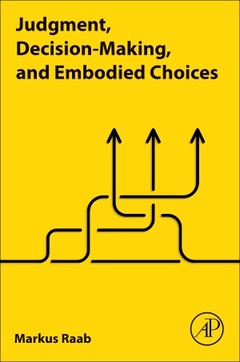Description
Judgment, Decision-Making, and Embodied Choices
Author: Raab Markus
Language: English
Subjects for Judgment, Decision-Making, and Embodied Choices:
Keywords
Adaptive toolbox; Anxiety; Body choices; Brain-gut axis; Chinese room; Choice evolution; Climate choices; Cognitive fallacy; Court decision; COVID-19; Creativity; Decisions under constraints; Depression; Diagnostic; Disorders; Embodied choice; Embodied cognition; Emotional decision; Esthetic choice; Expertise effects; Facial feedback; Fast and frugal heuristic; Finance; First choice; Gender choice; Gesture; Grasping; Gut decision; Gut feeling; Health decision; Hot choice; Illusion; Implicit learning; Intuition; Language; Language choices; Liking people; Medical decision; Moral choices; Moral decision; Movement; Movement choice; Movement sounds; Number choice; Problem-solving; Representation; Representations of choices; Risk; Rules of thumb; Shopping; Shopping decision; Simple heuristic; Situated choices; Societal decision; Space choices; Sport; Thought experiment; Time choices; Time pressure; Transcranial magnetic stimulation; Uncertainty; Vision choice; Walking
172 p. · 15x22.8 cm · Paperback
Description
/li>Contents
/li>Biography
/li>Comment
/li>
1. What Are Embodied Choices?2. Simple Heuristics - How We Make Decisions3. How the Body and the Environment Affect Our Thinking4. Action Enables Perception and Cognition and Thus Embodied Choices5. Decisions When Moving Your Mind6. Embodied Choices in Real Life7. Individual and Cultural Differences in Embodied Choices8. How Do You Choose When It Is Your First Time? 9. How Do Embodied Choices Evolve?10. How to Train Embodied Choices?11. How to Cope with Uncertainty in Covid-19 Times12. Ten Rules of Grounding Your Life on Embodied Choices
- Discusses the role of gut feelings and the brain-gut behavior connection
- Demonstrates that behavior influences decision and other people’s perceptions about mood or character
- Includes research on medical decisions and shopping decisions
- Illustrates how to train embodied choices




